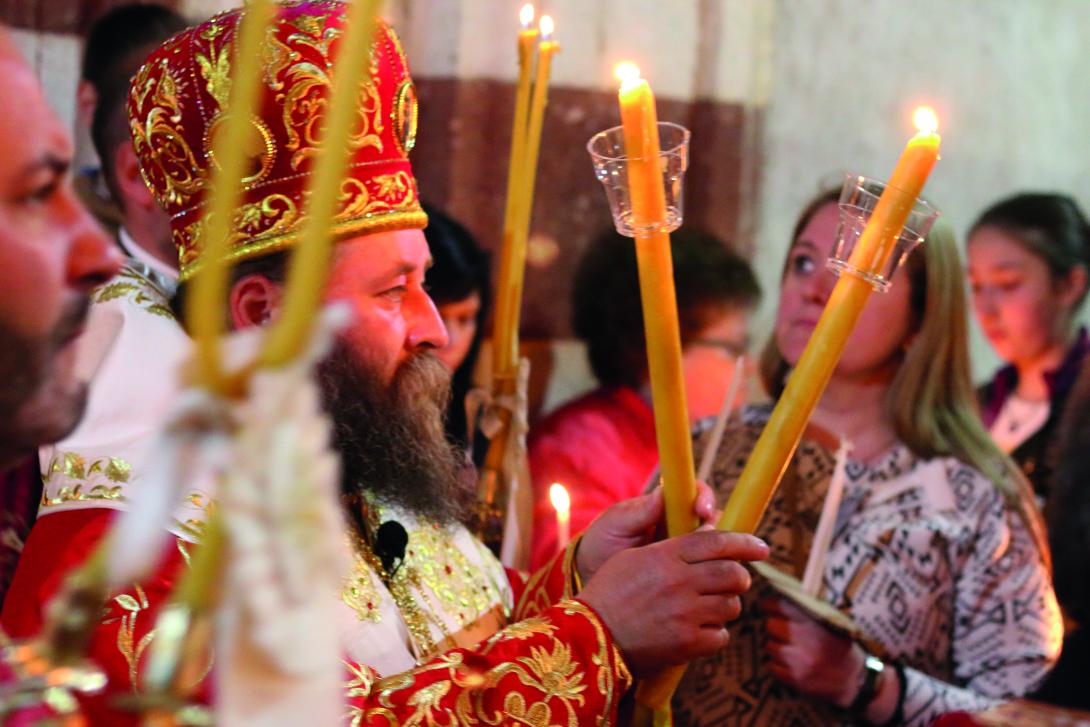
© Photo by Steve Harrris | unsplash.com
“I know of no good to have come from even a single synod; I know of no solutions that resulted, but only additional problems that arose. Their only outcomes are arguments, ambitions and rivalries; bishops prefer to reprove others rather than resolve internal church issues.”
When Archdeacon John Chryssavgis quoted these words of St. Gregory the Theologian during a Conference at St. Vladimir’s Orthodox Theological Seminary in January 2016, nobody yet anticipated the challenges that the Holy and Great Council of the Orthodox Church would face. At the time, after a preparatory process of over fifty years, all the primates of the Orthodox Churches were committed to coming to Crete from June 19 through 26, 2016. The fourth century words of St. Gregory echo with great accuracy the living reality and difficulties of a council and its synodal experience.
Synodality is a key principle in the governance and spiritual life of the Orthodox Church. It is an expression of the Church’s understanding of itself as the Body of Christ, with all its members functioning together in unity under the guidance of the Holy Spirit. Despite its many challenges, it is a mystery deeply rooted in the understanding of the Holy Trinity. This concept emphasizes the unity and communion of the Church, reflecting the divine life of the Triune God. As communion, synodality also underscores the importance of mutual participation, respect, and dialogue among the members of the Church, recognizing the value of diverse voices and experiences. As Professor Lewis Patsavos once put it: “Conciliarity, as a way of life of the Church, seeks to fashion ecclesiastical life in such a way as to express faithfully her essence and ethos. The Church’s synodal way of life, which reaches its highest expression in the episcopal synods, gives witness to the synergy of God and human beings for the realization of salvation and the endurance of truth.”
Meaning and essence
From the Greek word “σύνοδος” (journeying together, an assembly or gathering), “synodality” refers to the participation and collaboration of all members of the Church in decision-making processes. It emphasizes the communal nature of the Church and the unity and diversity of its members based on the mystery of the Holy Trinity.
The Holy Trinity is the ultimate model of unity in diversity. The Orthodox understanding of the Trinity, based on the teaching of the Cappadocian Fathers, serves as the foundation for synodality. Just as the three Persons are distinct yet inseparable, so too are the members of the Church, each possessing unique gifts and roles, united in faith and love.
It is through the Holy Spirit that the Church is guided, empowered, and enabled to discern the truth collectively. The Holy Spirit grants wisdom, discernment, and unity to the gathered assembly, allowing for the resolution of complex issues and the formulation of decisions. The unity that exists among the Persons of the Trinity is reflected in the communion (koinonia) of the members of the Church with one another.
Simultaneously, synodality is expressed through ecclesiastical structures, such as local and regional councils, synods, and especially the seven Ecumenical Councils. These gatherings bring together bishops, assisted by theologians, and representatives of the faithful to deliberate on matters of doctrine, practice, and discipline. Through synodality, the Church seeks to maintain the unity of the faith while respecting the diversity of cultural, historical, and regional contexts.
Synodality is not limited to hierarchical structures; it encompasses the entire body of the faithful. It calls for the active involvement of all members, clergy, and laity. Every member has a voice and contributes to the collective discernment and decision-making process. However, this collectiveness as the life of the Church moved by the Holy Spirit is only guaranteed by a strict understanding of primacy as described in the Chieti document issued in 2016 by the Joint International Commission for Theological Dialogue Between the Catholic Church and the Orthodox Church:
The term primacy refers to being the first (primus, protos). In the Church, primacy belongs to her Head—Jesus Christ, “who is the beginning, the firstborn from the dead; that in all things he might have the pre-eminence [protevon]” (Col. 1:18). Christian Tradition makes it clear that, within the synodal life of the Church at various levels, a bishop has been acknowledged as the “first”. Jesus Christ associates this being “first” with service (diakonia):
“Whoever wants to be first must be last of all and servant of all” (Mk 9:35). (par.4)
Historical development
The role of the bishop is pivotal in upholding the unity and communion of the Church. The bishop acts as a unifying figure, ensuring that synodality is exercised in a way that preserves harmony and coherence. Hierarchs, in collaboration with their fellow bishops, clergy, and laity, make decisions that promote the spiritual well-being of the faithful and safeguard the teachings of the Church. As Saint Ignatius of Antioch taught: “where the bishop is, there let all the people be, just as, where Jesus Christ is, we have the catholic church” (Letter to the Smyrnaeans, 8).
Conciliarity is closely related to synodality, emphasizing the importance of collective decision-making. Decisions are not made unilaterally by one individual, but are arrived at through prayerful discernment and consensus among the gathered assembly.
This conciliar approach ensures that decisions reflect the mind of the Church and are received and embraced by the faithful.
Seeds of synodality can be traced back to the early Christian communities, where decisions were made collectively and through the guidance of the Holy Spirit. The apostolic councils, such as the Council of Jerusalem, set the precedent for synodal decision-making, founded on the scriptural expression: “For it has seemed good to the Holy Spirit and to us” (Acts 15:28).
Ecumenical Councils held between the fourth and eighth centuries brought together bishops from across the Christian world to deliberate on matters of faith, doctrine, and discipline. The Councils of Nicaea, Constantinople, Ephesus, and Chalcedon, among others, established the foundations of Orthodox faith and practice. Alongside these, local and regional synods were convened to address specific issues and challenges faced in different areas.
The Holy and Great Council of Crete
The Holy and Great Council of Crete, held in June 2016, was a significant event in the Orthodox Church. The idea of convening a pan-Orthodox council—modeled after those essential earlier councils—had been discussed for decades, with several attempts made to bring the Orthodox autocephalous churches together. The Holy and Great Council of Crete was the culmination of such efforts, representing the first gathering of its kind in centuries.
The process of preparation involved extensive consultations, preconciliar conferences, and the collaboration of bishops, theologians, and representatives from the various Orthodox Churches. While not all churches participated, the Holy and Great Council aimed to reflect the consensus of all the autocephalous churches.
In his opening address, His All-Holiness Ecumenical Patriarch Bartholomew stated: “Without synodality, the unity of the Church is severed, the sanctity of its members is reduced to mere individual morality and articulation about virtue, catholicity is sacrificed in favor of particular individual, collective, national and other secular interests or intentions, and the apostolic message falls prey to various heresies and ruses of human reason.”
The Holy and Great Council addressed several important themes, including the mission of the Orthodox Church in the modern world, the importance of ecumenical dialogue, marriage and family, fasting, the autonomy and interdependence of the local Orthodox churches, and the relationship between the Orthodox Church and the rest of the Christian world. Its significance lies in its affirmation of the synodality and conciliarity of the Orthodox Church, its emphasis on unity and communion, and its commitment to engaging with the contemporary world. The Council’s decisions, despite the absence of four Churches, provide guidance and direction for the Orthodox faithful and serve as a foundation for future discussions and developments. The process of synodality does not end.
What’s next?
As Ecumenical Patriarch Athenagoras (1886-1972) said: “Synodality has been, and still is the basis of our Church.” Synodality is an integral aspect of Orthodox identity and functioning. It reflects the Church’s understanding of itself as the Body of Christ, with all its members united in faith, love, and shared decision-making. It ensures that the Church remains faithful to its mission, embracing unity in diversity, fostering communion, and engaging with the world in a spirit of love and service.
Through synodality, the Orthodox Church seeks to manifest the presence of the Holy Spirit, who leads and guides us on the journey towards salvation.













